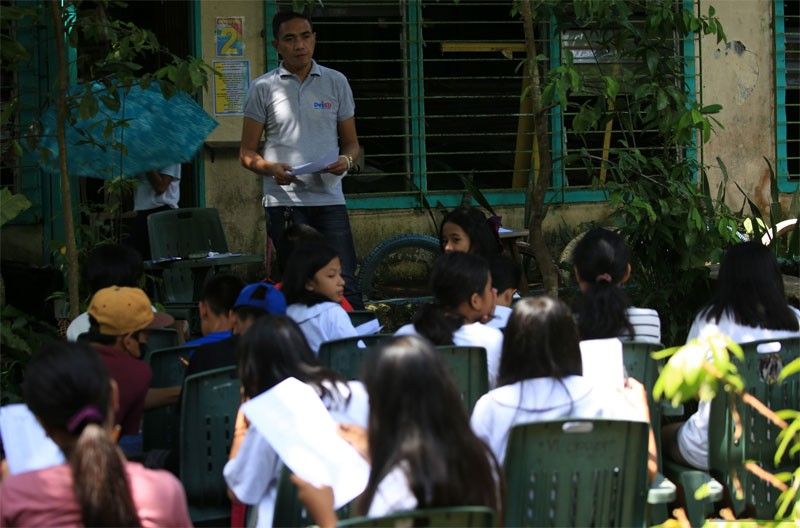
MANILA, Philippines — The Department of Education and lawmakers focused on education policy have highlighted the need for curriculum reforms to “take time” to work after recent Program for International Student Assessment (PISA) results indicate the country is now “stagnating at the bottom.”
Released on Tuesday, the latest PISA results show that Filipino students continue to rank below most of the world in mathematics, reading and science, with the Philippines neither improving nor regressing from its performance in the 2018 cycle.
In all three categories, just less than a quarter of students attained the minimum or basic level of proficiency — findings that DepEd said were similar to the results of recent National Achievement Tests.
“We do aim to be a top performer, but when that happens, that’s the question… The impact of reforms are not that immediate. It takes time for reforms to work,” Education Undersecretary Gina Gonong said during a press conference on Wednesday, referring to recent DepEd initiatives to revise the curriculum and implement learning recovery programs.
A more realistic goal, Gonong said, would be to achieve similar results to neighboring Asian countries Vietnam, Thailand and Malaysia.
“I think that’s more realistic in the coming years, maybe 2029 onwards,” Gonong added.
PISA noted in its global report that “the most significant changes” in education “can often only be seen and understood over the long term.”
“Some of the most important education-policy reforms affect how schools operate and what students learn only very gradually. For example, changes in initial teacher education can take decades before their effects are visible in most classrooms,” PISA said.
‘Bottomed out’
The latest PISA results also indicate that the Philippines has “bottomed out,” said Sen. Sherwin Gatchalian, chairperson of the Senate education committee.
“In the parlance of finance, we have hit the bottom. There’s no way for us to go up. We can expect later on to see improvements in scores,” Gatchalian said.
Similar to DepEd officials, Gatchalian lamented the single-digit changes in the Philippines’ scores in mathematics, reading and science from 2018 to 2022.
“Our improvements are statistically insignificant. That means we have stagnated and that’s a concern for us,” the senator added.
Budget restraints
Besides testing students in the fundamental subjects, the PISA report also included an assessment of countries’ investments in education.
PISA found that in the Philippines, the average spending per student ($11,030) is nine times lower than that of other countries.
“The data consistently show that student performance can be influenced by how poor or rich a country is, and that a base level of spending in education gives a better chance of having an effective education system,” PISA said in its 2022 report.
To address the pandemic’s impact on students’ competencies — which DepEd said had drastically impacted the PISA scores — Gatchalian said that the department needs at least P10 billion to fully fund its learning recovery programs in all 40,000 public schools.
In the proposed 2024 budget, the department only has P2.9 billion parked for various learning recovery initiatives.
The senator said that the additional P7 billion needed will have to come from “external financing” or international donors, as well as other sources in the General Appropriations Act, such as the contingency funds of the Office of the President, among other agencies.
“I think together we can convince the (Office of the President) to plow in more funds to intensify our learning recovery,” the senator added.
For Rep. France Castro (ACT Teachers), the government’s overall allocation of funds to the education sector needs to reach at least 6% of the gross domestic product (GDP) — the upper end of the United Nations’ recommended range for nations’ education budgets.
The results show the need “for building more classrooms, hiring more teachers and increasing their salaries as well as adopting a curriculum that would make learning easier for students and more attuned to the Philippine situation,” the lawmaker added.
Educator needed at the top
The latest PISA findings also point to the need for DepEd to be led by “an actual member of the education sector” to improve students’ performance, Castro added.
The Philippines’ dismal scores indicate “that the militaristic and ‘do as I say without questions asked-style’ in the DepEd now is detrimental to the learning of students,” Castro added.
“That allotting funds to surveil students and teachers is wrong since it deprives funds to hire more teachers or build more classrooms,” the lawmaker added.
Vice President and Education Secretary Sara Duterte said during a Senate budget hearing that the department includes students in its surveillance operations to prevent alleged illegal activities in schools.
This was part of the department’s defense of its now-realigned P150 million confidential funds.
The private sector-led Philippine Business for Education said the results are proof that the country’s education system is “in its worst state” but welcomed the DepEd’s continued participation in international tests.
“Efforts must also be made to use this assessment as guidance to improve our current situation and see the value of making data-driven decisions in education governance,” the group said. — Cristina Chi
*****
Credit belongs to: www.philstar.com
 Atin Ito First Filipino Community Newspaper in Ontario
Atin Ito First Filipino Community Newspaper in Ontario






